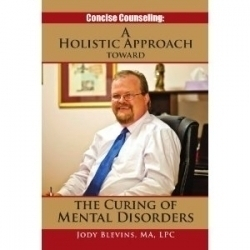Concise Counseling
A Holistic Approach Toward the Curing of Mental Disorders
In his debut book, Concise Counseling: A Holistic Approach Toward the Curing of Mental Disorders, licensed counselor Jody Blevins offers advice for people who think they may have a mental illness but are reluctant to seek help. He draws on his ten years of clinical expertise and the wisdom gained from his own personal struggles. He describes different types of mental illness, recommends steps the reader can take on the path toward wellness, and explains how to ascertain if the assistance of a professional therapist is necessary.
While the summary on the back cover of the book suggests Blevins’ ideas will benefit anyone with a mental illness, the author’s promotion of Catholicism as part of recovery suggests a more specific audience. In fact, the section of the book that covers spiritual wellness discusses Catholicism to the exclusion of all other faiths. In addition, the author uses a second frame through which to view mental illness—Freudian psychoanalytic theory. For example, he discusses id, ego, super-ego, and pleasure principle as though such things are immutable fact rather than theory.
The target audience for Concise Counseling changes throughout the book. At some points, Blevins addresses readers who wish to help themselves without therapy. Yet, he also advises readers to complete their own social histories and mental-health assessments—daunting tasks without the assistance of a clinician. Moreover, the author frequently mentions therapy, which indicates he recommends clinical intervention. Finally, Blevins use of mental-health jargon, such as the Freudian terms noted earlier, suggest the best target audience may be Catholic counselors with a Freudian orientation.
Despite confusion over its intended audience, the book contains information that will benefit readers. His discussion on how to change self-talk and why forgiveness is important provide a useful primer for beginners. Likewise, the section on meditation offers concrete suggestions for people who wish to start practicing meditation, as well as specific tips to help readers experienced in meditation improve their technique.
Unfortunately, the author oversimplifies important concepts such as assertiveness, passivity, and aggression, only to give a detailed definition of communication. He neglects to adequately define some Freudian terms and his own theory of something called digestive power. In the end, the reader may feel Blevins might have expressed his message more clearly by weaving his wisdom into an autobiography, drawing on his mental-health knowledge to illustrate personal experience.
Reviewed by
Jill Allen
Disclosure: This article is not an endorsement, but a review. The publisher of this book provided free copies of the book and paid a small fee to have their book reviewed by a professional reviewer. Foreword Reviews and Clarion Reviews make no guarantee that the publisher will receive a positive review. Foreword Magazine, Inc. is disclosing this in accordance with the Federal Trade Commission’s 16 CFR, Part 255.

